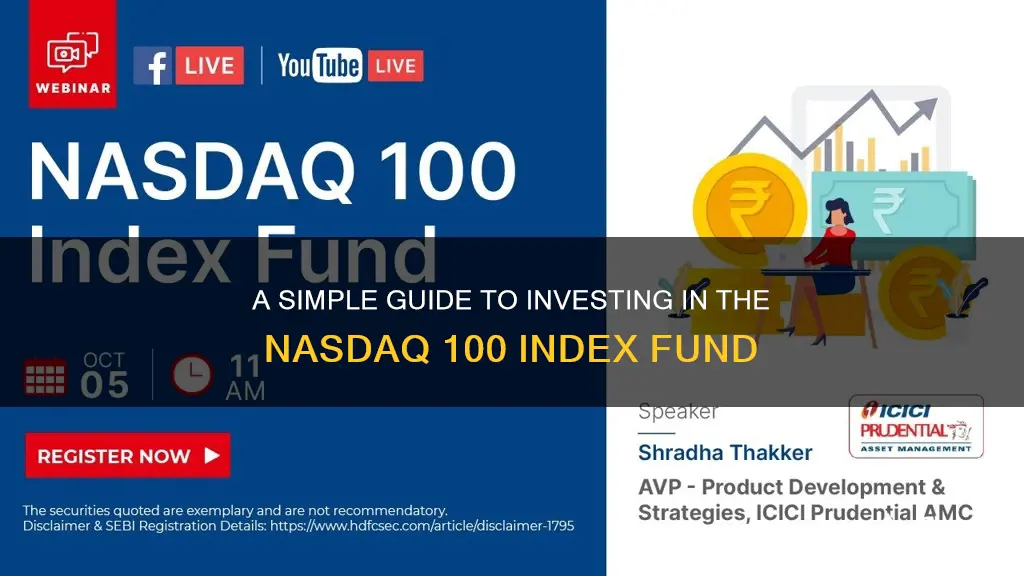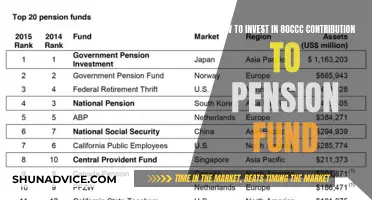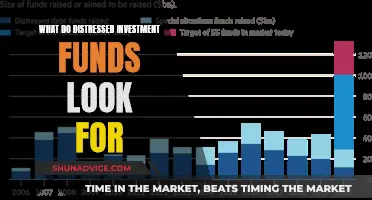
The Nasdaq-100 Index is a collection of the 100 largest, most actively traded non-financial companies listed on the Nasdaq Stock Exchange. It includes well-known technology companies like Apple, Microsoft, and Amazon, but also has significant exposure to other sectors such as consumer services, healthcare, and industrials. There are multiple ways to invest in the Nasdaq-100, including exchange-traded funds (ETFs), mutual funds, options, futures, and annuities. One of the oldest and most popular ways is the Invesco QQQ ETF, which is the second-most actively traded ETF in the U.S. and the fifth-largest by assets. For investors looking for a more balanced approach, the First Trust Nasdaq-100 Equal Weighted Index Fund offers exposure to the same basket of stocks but in an equally weighted manner, reducing the risk of concentration in a few large companies.
| Characteristics | Values |
|---|---|
| Investment options | ETFs, mutual funds, options, futures, annuities |
| Companies included | Apple, Amazon, Microsoft, Alphabet, Cisco, Intel, NVIDIA, Micron, Adobe, Advanced Micro Devices, Baidu, Gilead, Regeneron, Vertex, Amgen, Zoom, American Airlines, Expedia, Netflix, Pepsi, Costco, Starbucks, Tesla, Mylan, Meta, Facebook, Celgene |
| Number of companies | 100 |
| Index focus | Non-financial companies |
| Index type | Modified capitalization-weighted index |
| Trading options | Exchange-traded funds (ETFs), mutual funds, futures, options, annuities |
| Top ETFs | Invesco QQQ Trust, Series 1 ETF (QQQ), First Trust Nasdaq-100 Equal Weighted Index Fund (QQEW), ProShares Ultra QQQ (QLD), ProShares UltraPro QQQ (TQQQ), ProShares UltraPro Short QQQ (SQQQ), ProShares Short QQQ (PSQ), ProShares UltraShort QQQ (QID) |
| Top mutual funds | Shelton NASDAQ-100 Index Direct |
What You'll Learn
- ETFs, mutual funds, futures, options, and annuities are investment options
- The Nasdaq-100 is a modified cap-weighted index
- The index includes 100 of the largest domestic and international non-financial companies
- The Nasdaq-100 focuses on innovation and future growth
- The Invesco QQQ ETF is a popular investment fund

ETFs, mutual funds, futures, options, and annuities are investment options
There are several investment options to choose from when investing in the Nasdaq-100 index fund. Here is an overview of some of the most common options:
Exchange-Traded Funds (ETFs)
ETFs offer investors a diversified portfolio by tracking a pool of assets such as an index, sector, or commodity. They are traded on stock exchanges and can be easily bought and sold like stocks. The Invesco QQQ Trust, Series 1 ETF (QQQ) is one of the oldest and most popular ETFs for investing in the Nasdaq-100. It is the second-most traded and one of the most liquid ETFs in the United States, with an expense ratio of 0.20%. Another option is the First Trust Nasdaq-100 Equal Weighted Index Fund (QQEW), which offers an equally weighted portfolio of Nasdaq-100 stocks.
Mutual Funds
Mutual funds are a good option for those seeking diversified exposure and long-term growth with minimal risk. They are designed to protect your income and assets while providing exposure to a broad range of companies. The USAA Nasdaq-100 Index Fund (USNQX) is an example of a mutual fund that tracks the Nasdaq-100 index. It has expenses of 0.45%, which is higher than the average ETF but relatively low compared to other mutual funds.
Futures
Futures are derivative contracts that provide a way to invest in commodities markets. They are typically used for hedging or speculation and are suitable for more sophisticated investors. Nasdaq-100 futures can be a hedge against swings in tech earnings, offering multiple kinds of protection. Examples of Nasdaq-100 futures include CME E-mini Nasdaq-100 Futures and TAIFEX Nasdaq-100 Futures.
Options
Options are also derivative contracts that give investors the right to buy or sell a security at a specific date and price. They are suitable for sophisticated investors and can be used for hedging. Nasdaq-100 options include traditional AM-Settled Monthly and PM-settled Monday, Wednesday, Friday, and weekly expires.
Annuities
Annuities are insurance products that provide guaranteed income after retirement. They can be funded with a lump sum or through regular payments. Annuities that track the Nasdaq-100, such as those offered by Nasdaq Insurance Solutions, have consistently performed well over time.
It is important to note that investing in the Nasdaq-100 or any other index carries risks, and it is always recommended to consult with a financial advisor before making any investment decisions.
A Swiss Guide to Index Funds Investing
You may want to see also

The Nasdaq-100 is a modified cap-weighted index
The Nasdaq-100 is a stock market index comprising 100 of the largest domestic and international non-financial companies listed on the Nasdaq Stock Market. It is a modified capitalisation-weighted index, meaning that the stocks' weights are based on their market capitalisations, but with rules capping the influence of the largest components.
The index is made up of companies from a range of sectors, including technology, healthcare, consumer goods, and industrials. Notably, it does not include any financial companies, which are instead listed in the separate Nasdaq Financial-100 index.
The Nasdaq-100 is designed to provide a broad overview of the market and includes some of the world's largest companies, such as Microsoft, Apple, Amazon, and Tesla.
The index is reviewed and adjusted quarterly by Nasdaq to ensure that the distribution requirements are met and to prevent over-concentration. This involves comparing the components with those not in the index, re-ranking eligible companies, and making adjustments as needed.
There are several ways to invest in the Nasdaq-100, including through exchange-traded funds (ETFs), mutual funds, futures, options, and annuities. The Invesco QQQ ETF, for example, is one of the oldest and most popular ways to gain exposure to the index.
The Nasdaq-100 is a well-diversified index, offering investors access to a mix of sound companies across various sectors. It has generated higher growth rates than competing indexes, such as the S&P 500 Index and the Russell 1000 Growth Index, making it an attractive investment option.
Invest HSA Funds: Long-Term Benefits, Tax-Free Returns
You may want to see also

The index includes 100 of the largest domestic and international non-financial companies
The Nasdaq-100 index includes 100 of the largest domestic and international non-financial companies listed on the Nasdaq Stock Market based on market capitalization. These companies come from a variety of sectors, including technology, healthcare, consumer goods, and industrials.
Some of the largest companies in the world are included in the index, such as Apple, Amazon, Microsoft, Alphabet, and Nvidia. The index also includes prominent technology leaders such as Cisco, Qualcomm, Intel, and Adobe.
The Nasdaq-100 is well-known for its focus on innovation and future growth, with companies that are symbolic of these values. This focus has resulted in higher growth rates compared to competing indexes such as the S&P 500 Index and the Russell 1000 Growth Index.
The index is not limited to companies from the United States, and includes several international companies as well. As of June 2024, there were seven companies incorporated outside of the US:
- PDD Holdings (Cayman Islands, headquartered in China)
- ASML Holding and NXP Semiconductors (The Netherlands)
- Arm Holdings, AstraZeneca, and Coca-Cola Europacific Partners (United Kingdom)
The Nasdaq-100 is a diverse and dynamic index, reflecting the largest and most innovative companies across various sectors and countries.
Index Funds: Investing via ICICI Direct
You may want to see also

The Nasdaq-100 focuses on innovation and future growth
The Nasdaq-100 Index (NDX) is one of the world's preeminent large-cap growth indexes. It is comprised of 100 of the largest and most innovative non-financial companies listed on the Nasdaq Stock Market based on market capitalization.
The index is home to some of the world's most influential and innovative companies, including Apple, Amazon, Microsoft, Alphabet, and Tesla. These companies have built their success on innovation, disrupting industries and reshaping society.
The Nasdaq-100 has a strong focus on technology, with well-known names such as Apple, Microsoft, and Nvidia. However, it also includes category-defining companies at the forefront of innovation in other sectors, such as Amgen and Starbucks. These companies are leading the way in cutting-edge research and development, with a commitment to investing heavily in R&D.
The perception of Nasdaq-100 companies as innovators is core to their brands and products. They are market leaders, startups, and unicorns that are driving change and delivering financial performance. This focus on innovation has resulted in the Nasdaq-100 generating higher growth rates than competing indexes such as the S&P 500 Index and the Russell 1000 Growth Index since 2008.
The index's unique focus on innovation and future growth makes it an attractive investment opportunity for those seeking to invest in a strong, diversified portfolio of large-cap growth companies.
The S&P 500 Index Fund: A Beginner's Guide to Investing
You may want to see also

The Invesco QQQ ETF is a popular investment fund
The Invesco QQQ ETF is a passively managed fund that tracks the Nasdaq-100 index, which includes the 100 largest non-financial companies listed on the Nasdaq Stock Market based on market capitalization. This means that the fund's performance is closely tied to the performance of the Nasdaq-100 index, and it provides investors with exposure to some of the world's leading technology and growth companies.
The fund has a relatively low expense ratio of 0.20%, which means that for every $10,000 invested, investors pay $20 annually. This low expense ratio, combined with the fund's strong and consistent returns, has made it a popular choice for investors seeking exposure to the technology and innovation sectors.
The Invesco QQQ ETF provides investors with diversified exposure to a range of innovative companies across sectors such as software, hardware, e-commerce, social media, and biotechnology. The fund's top holdings include well-known technology companies such as Microsoft, Apple, Amazon, and Google.
In addition to its diversification benefits, the Invesco QQQ ETF also offers tax advantages when compared to traditional mutual funds. ETFs are generally more tax-efficient due to their "in-kind" creation and redemption feature, which reduces cash transactions and capital gains distributions. As a result, investors tend to retain more of their returns.
Overall, the Invesco QQQ ETF is a popular investment fund that provides investors with access to a diversified portfolio of innovative, industry-leading companies, all through a single investment. Its strong performance, low fees, and tax advantages make it an attractive choice for those seeking exposure to the technology and growth sectors.
Axis Long Term Equity Fund: A Smart Investment Strategy
You may want to see also
Frequently asked questions
The Nasdaq 100 Index is a list of the 100 largest companies by modified market cap that trade on Nasdaq exchanges in the basic materials, consumer discretionary, consumer staples, healthcare, industrials, technology, telecommunications, and utilities sectors. It is a diversified index providing a broad overview of the market, covering a variety of sectors.
Investors can gain exposure to the index through exchange-traded funds (ETFs), mutual funds, futures and options, and annuities. For the average investor, ETFs are generally the simplest and least risky means of gaining exposure to the companies in the index.
Some of the best-known Nasdaq 100 Index funds include the Invesco QQQ Trust, Series 1 ETF (QQQ), the First Trust Nasdaq-100 Equal Weighted Index Fund (QQEW), and the ProShares Ultra QQQ (QLD).
As with any investment, there are risks involved in investing in the Nasdaq 100 Index. The value of the companies in the index may fluctuate due to economic conditions, changes in interest or currency rates, regional or global instability, natural disasters, public health issues, war, and other factors. Additionally, the Nasdaq 100 Index has a large weighting in technology shares, so it may be more volatile than a more diversified index.







